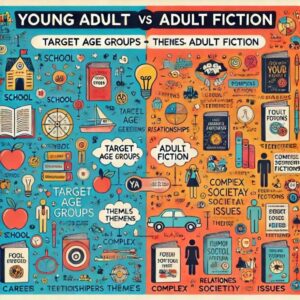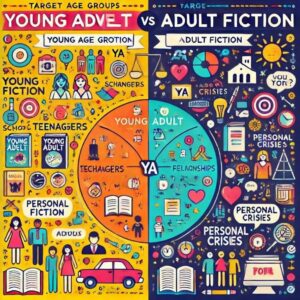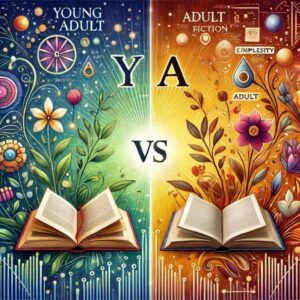Young Adult vs. Adult Fiction: A Comparative Insight

When exploring the literary world, Young Adult (YA) and Adult Fiction stand apart in terms of their target audience and thematic elements. Although their boundaries sometimes overlap, understanding what sets them apart provides valuable insight for both readers and writers alike.
Audience and Age Demographics

One of the key distinctions is the target age group. YA fiction is primarily written for readers aged 12 to 18, whereas adult fiction is aimed at readers 18 and above. Interestingly, many adults are drawn to YA novels for their engaging, fast-paced plots and relatable themes, which leads to a notable crossover appeal between the two genres.
Themes and Exploration

YA fiction typically focuses on coming-of-age narratives, identity exploration, friendships, family dynamics, and the journey of self-discovery. These stories often tackle the trials of adolescence, capturing the emotional experiences that shape a young person’s transition into adulthood.
On the other hand, adult fiction explores more mature and often complex themes such as relationships, personal crises, societal issues, and moral dilemmas. These stories demand deeper introspection and challenge readers with nuanced, multifaceted perspectives.
Complexity and Storytelling
YA novels are often characterized by accessible language and fast-moving plots. While written with younger audiences in mind, these books don’t shy away from addressing significant issues like mental health, grief, and social challenges—they simply present them in a way that resonates with young readers.
In contrast, adult fiction tends to offer more complexity, with intricate narratives, multi-layered character arcs, and a focus on subtle emotional development. The pacing might be slower, allowing for deeper exploration of themes and characters.
Protagonist Age and Life Experience

YA fiction typically features teenage protagonists, whose experiences revolve around school, friendships, family, and the struggle to define their identity. In contrast, adult fiction tends to follow older characters navigating adult responsibilities such as careers, marriage, and broader life challenges. The maturity and experiences of adult characters bring different dimensions to the story.
Tone and Writing Style
The tone of YA fiction is often hopeful, with an emphasis on growth and self-discovery. Conflicts in YA books usually conclude with a sense of resolution or personal development. On the other hand, adult fiction can delve into more serious, sometimes darker tones, reflecting the complexities of adult life. The writing style in adult fiction is often more detailed and reflective, catering to readers who seek deeper narratives and intellectual engagement.

Both YA and Adult fiction offer distinct reading experiences, each valuable in its own right. YA fiction captures the energy and emotional struggles of adolescence, while adult fiction delves into the intricacies and moral complexities of grown-up life. Regardless of age, both genres have the power to entertain, inform, and inspire readers.